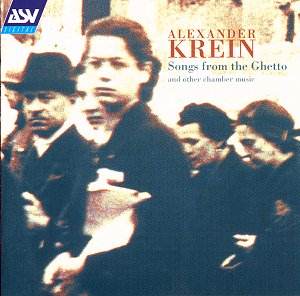ASV has here revived the posthumous fortunes
of Alexander Krein, born in Novgorod in 1883. His was a musical
Jewish family and he was one of seven brothers, three of whom
pursued musical careers, one of them, David, as a violinist. Alexander
Krein entered the Moscow Conservatory at fourteen, taking composition
lessons from Taneyev amongst others, saw his first works into
print (as early as 1901) and carved out something of a reputation
as a composer of chamber music. When he joined the Society for
Jewish Folk Music he began to weave such music into the established
orthodox chamber works of his training - and some feature on this
disc. He taught at his alma mater for a number of years before,
after the 1917 Revolution, assuming some musico-political positions
and later becoming a member of the jury of the State Publishing
House. At the end of that decade, just before the purges (during
which David, his brother, committed suicide), he wrote his last
overtly Jewish inspired work, the opera Zagmuk. All the works
recorded here date from 1903-1929; the last, the Three Songs from
the Ghetto were written concurrently with Zagmuk.
To the question Ďwhat was Krein like as a composer?í
one should note that influences are distinct but certainly not
overpowering of his talent. By the time of the attractive Elegy
of 1913 with which the disc begins one can hear an admixture of
late nineteenth century Russian and burgeoning French impressionism
Ė though the elegiac material is too noble and stately really
to assimilate the latter influence, if influence it is. Itís the
slightly earlier Poème-Quatuor that strikes a more immediately
impressive note. This is a well-constructed nineteenĖminute work
that utilises his considerable powers of construction. Itís also
highly evocative writing, distinctly impressionist in cast and
shot through with Scriabinís influence. The lyrical sections are
reached with imperceptible eloquence, the tremolandos full of
colour, the harmonies piquant and ear catching but never merely
decorative though some do sound slightly diffuse. The work ends
with affectionate simplicity and itís a fine work and deserves
to be heard.
The 1928 Jewish Melody for cello and piano is
one of those last Jewish works that he wrote in the later 1920s;
harmonies are sophisticated but the work is brief. The Three Songs
from the Ghetto, from one year later, comprise an opening song
that is communing and withdrawn and a second that has some soaring
declamation of an overwrought lyric. I admired the essentially
reflective vocal line and the busy piano part and the excellence
of the piano postlude. The last of the three settings, Tears
Welled Up, is more recognisably Jewish in its melismatic impress
though it rather lacks the distinction of its companion songs.
The Two Hebrew Songs are intriguing. The first is cosmopolitan
with any Jewish edges smoothed out, Krein making a virtue of an
assimilationist aesthetic here, or thatís what it seems like.
The second is avuncular and broad shouldered, not least in its
politicised reference to the Red Star on the singerís cap.
He five Preludes were his Op 3 and delve back to the period between
1903-06. They are short, slow, romantic, charming but no more.
There is a sublimated, rather generalised fervour that makes one
think that young Kreinís heart wasnít quite in them. The primary
influence is Tchaikovsky (especially in the first Andantino) and
itís really only the second Andantino that hints at more complex
material with its restless harmonies and assertive use of the
bass.
The 1927 Aria was written in memory of his brother
David, a suicide. The violin Ė Davidís own instrument of course
Ė opens in its middle register, keening and muted before ranging
emotively, unsettled. Even when the fiddle turns to the lower
register Krein writes no consoling melody and the music remains
beyond the touch of easy acceptance. The Jewish Sketches of 1909
were dedicated to Kreinís parents and are in three short movements.
Here, early in his career, he had yet to do what he did with the
Hebrew Songs. In the earlier work the strong klezmer influences
are readily apparent though nicely integrated and not subordinated
Ė Kreinís father Abram was Lithuanian by birth and a klezmer musician
and folklorist and the lineage is apparent, the salute undeniable.
The Almira Quartet are here joined by clarinettist Elizabeth Drew
and they relish the second of the sketches in particular where,
over tremolando strings, the clarinet grows towards a klezmer
melody. There are also fine, strong unison passages for strings
and a particularly expressive role for cello. The final sketch
is nicely motoric with fluttering first violin, warm inner voicings
and liquid clarinet and a concluding upward flourish.
The explicatory notes, to which Iím indebted,
are by Jonathan Powell who, together with Joseph Spooner, was
pretty much responsible for the whole disc. The song texts are
here, sound quality is excellent and in natural perspective with
performances to match.
Jonathan Woolf
